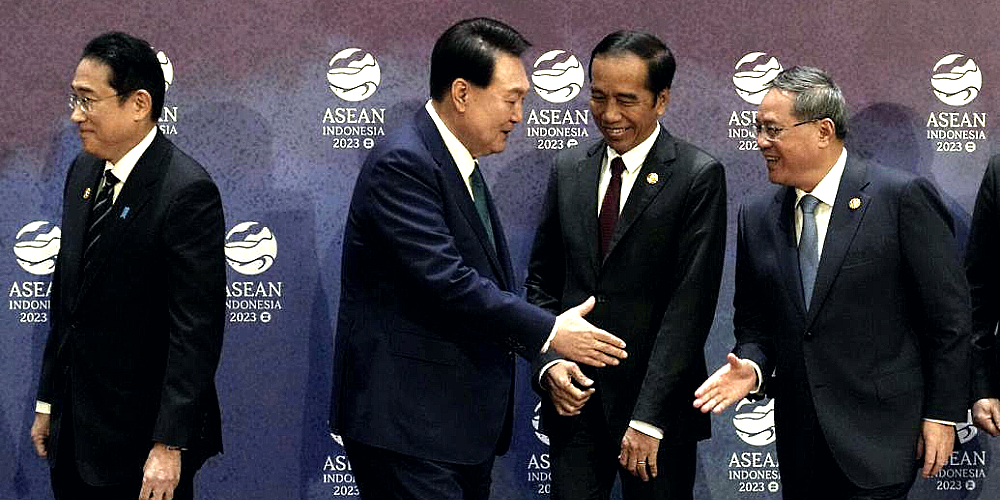JAKARTA: ASEAN-related summit meetings in Jakarta on Wednesday provided an occasion for the first face-to-face meeting between leaders from Japan and China since the release of treated water into the ocean from the Fukushima No. 1 nuclear power plant began on Aug. 24.
In those meetings related to the Association of Southeast Asian Nations, Prime Minister Fumio Kishida underscored that the safety of the treated water has been secured and he criticized China’s response to the discharge, as the response is not based on scientific evidence.
At the ASEAN Plus Three meeting of ASEAN members plus Japan, China and South Korea, Kishida explained Japan’s handling of the treated water in a calm tone.
Kishida said that the data from monitoring since the discharge began last month has been made public in “a prompt and highly transparent manner.”
It was an apparent attempt to counter Chinese criticism by emphasizing measures that have been taken to secure safety.
In preparation for the meeting, Japanese government officials carefully crafted the wording of Kishida’s remarks until just before the event.
During the preparation, a proposal was floated to take a more hard-line stance against China over its suspension of imports of Japanese marine products, strongly condemning the reaction as a form of “economic coercion” to exert pressure by unfairly restricting trade.
However, ASEAN countries and South Korea have shown a certain degree of understanding for the Japanese government’s position.
A senior official of Japan’s Foreign Ministry said the government eventually decided that it would be easier to gain support if the government were to take a levelheaded approach to the matter and avoid a fight consisting of emotional attacks against each other.
In its criticism of China’s responses to the treated water release, the Japanese government kept to a restrained approach, describing the responses as “uncommon actions.”
Prior to the ASEAN-related meetings, the Japanese government also took preparatory steps such as submitting a complaint to the World Trade Organisation requesting the removal of the import suspension on marine products.

Tone of China’s criticism
Meanwhile, China has criticized the Japanese government’s handling of the treated water whenever senior Chinese officials, such as Foreign Minister Wang Yi, have attended international conferences.
However, there has been no overt criticism at the level of Premier Li Qiang, the second-ranking Communist Party official, or higher.
A Japanese government source said that the government was closely monitoring Li’s remarks as they could mark a turning point or help foresee the future of Japan-China relations.
At the ASEAN-related meetings, Li kept his tone less critical, calling on Japan to faithfully fulfill its international obligations.
According to sources close to ASEAN, Li did not raise the issue of treated water at the meeting between China and ASEAN on Wednesday.
“The tone of criticism [by Li] was not outside of our expectations,” a Japanese Foreign Ministry source said. “The Chinese side is trying to find the right moment to lower their raised fists.”
Submission of relevant information
On the Japan side, there is no intention to make any concessions on the matter.
When Kishida heard that Li had entered a waiting room before attending one of the ASEAN-related meetings, he hurried to the waiting room, leaving behind a partially eaten lunch.
Kishida told his aides, “Let’s catch him,” according to sources.
Kishida approached Li, calling for the import ban to be lifted and insisting that there has been no flaw in the handling of the treated water by the Japanese government.
Understanding of Tokyo’s handling of the water is spreading in the international community, including the United States, France and Australia, increasing China’s “isolation” on the issue.
On Tuesday, the Australian Embassy in Japan posted on X (formerly Twitter) a video of embassy members eating fish and chips made with fish from Fukushima Prefecture.
In the video the members said in Japanese, “We support Fukushima produce [by eating it],” and “Fish from Fukushima is safe.”
U.S. Ambassador to Japan Rahm Emanuel has also stated that the United States will continue to buy Japanese marine products.
“It’s clear that China’s current position is not favorable for them,” a senior Japanese government official said.
“Questioning the views of the International Atomic Energy Agency will not bring any understanding.”
Kishida told reporters in Jakarta that his government “would continue to thoroughly explain Japan’s position and policy, which is being handled with the IAEA’s involvement, at international conferences and other opportunities.”
ADVERTISEMENT
ADVERTISEMENT








































